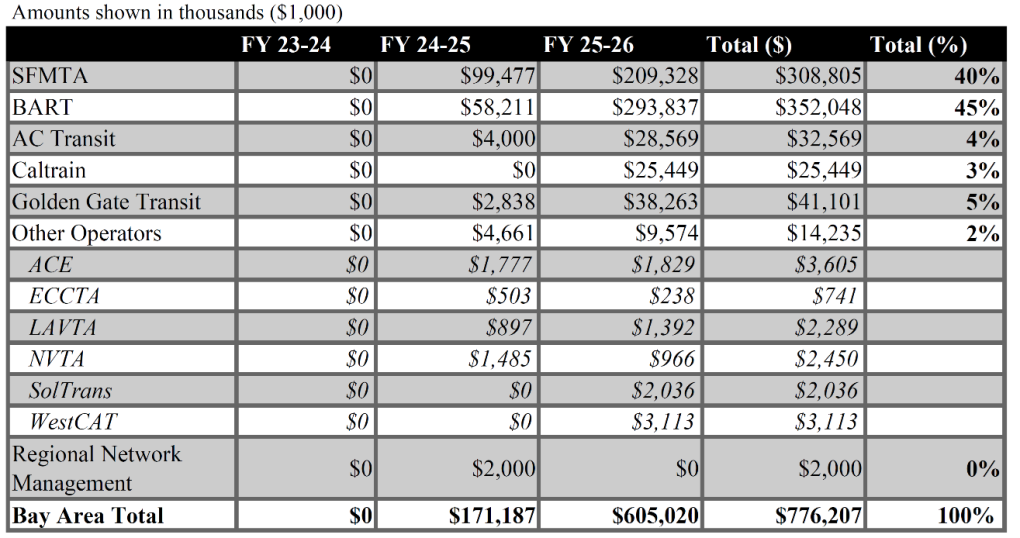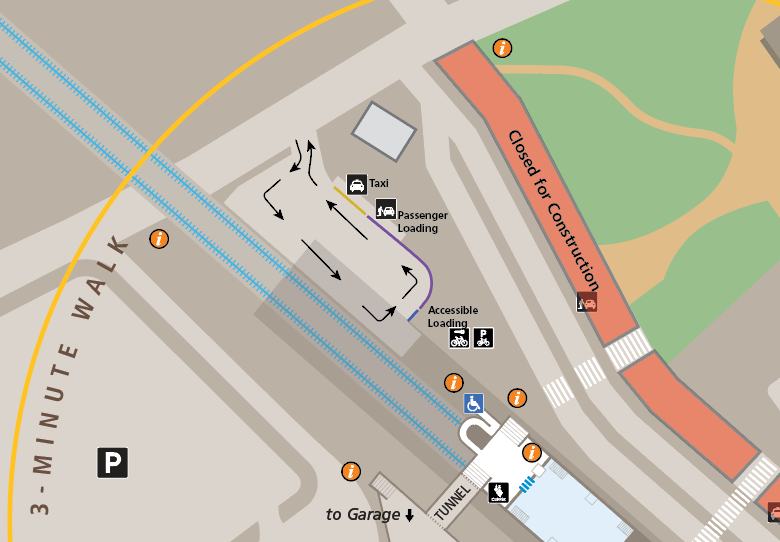Search Results
Rider alert: Major Transbay Tube delays on weekend of June 4-5
PRESS CONFERENCE VIDEO FROM FRIDAY, MAY 27 The first weekend of critical maintenance work on the Transbay Tube went according to plan, with another round coming up the weekend of June 4-5. The maintenance means major delays and additional transfers for some customers going through the Transbay Tube.
MTC funding plan of state budget funds for transit operations bolsters regional coordination efforts
The Metropolitan Transportation Commission’s approval today of state budget funds and other regional funds for Bay Area transit agencies bolsters an ongoing regional coordination effort and provides essential stopgap operational funding for transit in the Bay Area. Today’s action is a culmination of hard work led by transit agencies and the MTC to advocate for operations funding to ensure continued transit service throughout the Bay Area.
MTC Commissioners approved a distribution framework for an anticipated $447M in state budget funds from Senate Bill 125 and approximately $300 million of regionally controlled funds to transit agencies while requiring that the agencies enhance the customer experience and improve internal efficiency.
Bay Area transit General Managers are meeting on a weekly basis to enhance coordination between agencies and improve connectivity. This transit network coordination work will require more funding to ensure agencies can continue to run reliable service while also focusing on new enhancements.
A key component in the decision to allocate these funds will be the continuing implementation of the Transit Transformation Action Plan, a comprehensive plan for better regional transit coordination and improved rider experience. It encompasses closer fare coordination such as the Clipper BayPass pilot, the expansion of Clipper START offering discounts for low income riders, free or discounted transfers between systems, aligning schedules so it’s easier for riders to make connections between agencies, and more understandable mapping and wayfinding with a uniformed approach to signs to help riders navigate their way through transit systems.
While state funds are vital to continue near-term operations, they fall short of the Bay Area’s funding needs beyond FY26. The MTC and the Bay Area transit agencies are studying options for additional revenues including a regional transportation measure in 2026.
MTC plans to revisit the estimated needs for all operators each year to program the following year’s funding. The proposed programming amounts for all operators across FY25 and FY26 are included in the table below.

Transit agency General Managers praise the new funding and support.
BART General Manager Bob Powers said, “This funding from the MTC supports BART’s new Safe and Clean Plan to welcome riders back to our system and it buys us time to explore a sustainable funding model while avoiding devasting service cuts. Our latest data shows our investments are paying off with great improvements in reliability and police presence. BART is also committed to continue working with all Bay Area transit agencies on transformational improvements that will improve service for transit dependent riders and make it easy for people to ditch their cars and take transit instead. We want to thank the Commission for their approval of these funds and their leadership throughout this process.”
SFMTA Director of Transportation Jeffrey Tumlin said: “This is very good news for the nearly half a million people who ride Muni every single day. It gives Bay Area transit agencies more time to recover from the impact of the pandemic, which changed commute patterns and is still taking an economic toll on downtown San Francisco. These funds will keep Muni financially stable for longer than we had expected provided that we don’t expand Muni service beyond current levels. We’d like to thank MTC, the state legislature and the governor for their actions to make this happen. We’re proud that despite our financial challenges, Muni service is safe, clean, fast, frequent and reliable -- and we plan to keep it that way.”
Caltrain Executive Director Michelle Bouchard said: “We are grateful to our state leaders for securing these funds and to MTC for the proposed FY26 allocation to Caltrain that will allow us to continue working with our regional partners to coordinate an easy and integrated experience for Bay Area transit riders. With the launch of electrified service next year, Caltrain will greatly improve our service and the rider experience. Electrification will mean up to 25 minutes in time savings on local trips and increase of service to all the stations, including half hour service during weekends and off-peak hours. The trains will have wi-fi, power outlets at every seat and new safety features. We are proud to keep working on a world-class, modern and climate friendly system that the region deserves.”
Golden Gate Bridge, Highway and Transportation District General Manager Denis Mulligan said: “We want to thank MTC, the state legislature, and the governor for their continued support of Bay Area transit. These funds are a much-needed shot in the arm that will help us provide first-class bus and ferry service for our customers into the future. We look forward to continued collaboration with our transit agency partners to roll out even more improvements for Bay Area riders.”
Temporary parking changes at Lafayette Station start mid to late June (Update)
Update: May 25, 2017 Starting in mid to late June, 2017 (this is an updated start date), we will be making improvements to station access and the parking lots at Lafayette Station. This project will increase the number of ADA-compliant parking spaces, improve signs, replace paving, improve circulation through
Report a Hot or Cold Car
Innovative pilot program results in promising ridership growth for Bay Area transit agencies
New data shows Clipper BayPass a huge success in encouraging the use of transit as it enters its next phase
A two-year pilot program designed to test how an unlimited transit pass would work in the Bay Area has recorded more than 2 million trips among participants in its first year of existence. Clipper BayPass provides 50,000 college students and affordable housing residents with a Clipper card that allows them free, unlimited rides on more than two dozen Bay Area transit systems.
The next phase of the BayPass pilot program involves recruiting and enrolling Bay Area employers into the program with an announcement of the first major employer that has committed to offering the benefit to employees being announced in the coming days.
The goal of Clipper BayPass is to measure if giving participants a prepaid card that offers unlimited trips and transfers between systems encourages people to take more transit. The latest numbers measuring ridership from the launch of the pilot in August 2022 to August 2023 paint a clear picture:
*Clipper BayPass cards are logging 40% more trips than the average single-agency Clipper card.
*74% increase in transfers between transit operators
*85% of Clipper BayPass users agree that BayPass helps them travel to new locations in the Bay Area
“In just its first year of existence Clipper BayPass is already establishing itself as a shining example of regional coordination among Bay Area transit agencies,” said BART General Manager Bob Powers. “Clipper BayPass is giving us a vision of the future of Bay Area transit and shows if we make transfers between systems more seamless ridership will increase across the board.”
“It’s exciting to see real-world data on the role fare coordination can play in helping to boost transit ridership,” said Metropolitan Transportation Commission Executive Director Andrew Fremier. “We want to build a more equitable and seamless fare system for the Bay Area. Studying a regional fare pass using students and residents of affordable housing communities shows that commitment.”
Participants in Phase 1 of Clipper BayPass include students at UC Berkeley, San Francisco State University, San Jose State University, and Santa Rosa Junior College as well as residents at affordable housing communities managed by MidPen Housing.
Clipper BayPass is now Recruiting Employers
The next phase of Clipper BayPass involving Bay Area employers launches in January 2024. The program will expand to include about 20,000 employees from a diverse range of employers varying by types of industries, employer sizes, and geographic locations. The program is currently recruiting employers looking to be one of the first to offer their employees the benefits of unlimited transit. More information and an interest form are available at clipperbaypass.com
Funding for the Unlimited Pass Pilot
Clipper BayPass is comanaged by the Metropolitan Transportation Commission (MTC) and BART. The MTC Commission has allocated $4.5 million to reimburse transit operators for the cost of trips taken during the first phase of the program. In Phase 2, participating employers will pay MTC for employee transit passes and MTC will reimburse transit operators for employee trips taken.
Hayward Station: Passenger loading zone temporarily moved 10/9/2023 through 10/13/2023
The Hayward Station passenger loading zone will be temporarily moved from Monday, October 9, 2023 and Friday, October 13, 2023 so that improvements to the sidewalk can be made.
While the sidewalks improvements are being made, the passenger loading zone will be moved to the parking lot area nearest the station entrance (see area outlined in picture). Motorcycles can park for free in any space on the other side of the station during the construction. Temporary wayfinding signage will be posted to direct customers.
Thank you for your patience as we work to improve access to the BART Station.

Parking Maps & Pricing
Single Tracking Alert: Service to be reduced to one track at West Dublin/Pleasanton Station during late night and early morning hours September 27 through 29 to install new fiber cables
BART crews will be in the trackway near West Dublin/Pleasanton Station to install new fiber cables. These cables will help to expand advanced wireless connectivity in this part of the system.
The work is scheduled to happen between 9pm Friday September 27 and 7am Saturday, September 28 as well as between 9pm Saturday, September 28 and 9am Sunday, September 29. During those hours, riders should expect delays of 10-15 minutes. The work is not expected to impact service outside of those evening and early morning hours.
Reducing service to one track helps to ensure safe conditions for workers.
Oakland Airport Connector schedule change for maintenance in December 2024
BART's Oakland Airport Connector will be undergoing planned maintenance on its trackway equipment for several days in December. The work will happen during revenue service each of the days listed below:
- Tuesday, December 3rd.
- Wednesday, December 4th
- Tuesday, December 10th
- Wednesday, December 11th
During the maintenance, one track will remain in operation, and trains will arrive every 18 minutes, rather than every 9 minutes. This work is necessary preventative maintenance which will help ensure that the Oakland Airport Connector remains safe and reliable.
We apologize for this inconvenience and appreciate your patience.